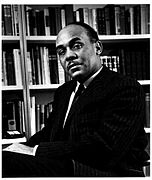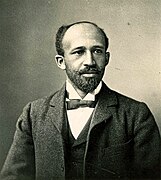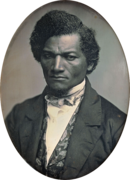Cornel West Lecture 1: Philosophic Prelude
The first event of this year’s Gifford Lecture Series took place last night at the Informatics Forum, chaired by Professor David Smith, Deputy Head of the College of Arts, Humanities, and Social Sciences. Joined by a sold-out in-person audience and over 800 live-stream attendees across the world, this event marked an enthusiastic welcome to our esteemed guest speaker, Professor Cornel West, as he discussed his conviction that the vocation of philosophy can be, in the language of the jazz musician John Coltrane, a force for good in a broken world.
You can watch the Lecture recording on YouTube, and join in the discussion by leaving a comment at the bottom of this page.
Below is the lecture summary and a response from PhD Student in American Literature, Mariane Gallet.
In the first of his six Lectures, Dr West introduced a range of the ideas and thinkers that inform his philosophical work in and beyond the Gifford Lecture Series, seeking to answer the question of how we might emerge from the bleakness of our catastrophic times, and the intersecting crises of warfare, environmental collapse, and political inefficacy that surround us.
Dr West opened his Lecture by attending to the influences that have shaped his work; offering gratitude to the Gifford Lecture committee, to his wife and parents, and the myriad academics and collaborators who have shaped his thinking, he reflected on how piety is the acknowledgement of the forces of good that shape our lives, and informs one’s sense of vocation and calling.
The work of philosophy, however, cannot be to erase those forces of aggression and oppression that such love and compassion works against. Expressing his desire to say something that might thoroughly unsettle, unnerve, or unhouse the audience, central to Dr West’s lecture was the complicated work of acknowledging injustice and catastrophe while at the same time seeking to transform the world into something better.

Statue of David Hume, Edinburgh
Taking David Hume as an example, Dr West reflected on how perhaps the finest philosophic mind in the English language also held white supremacist sensibilities, and was, like all of us, a child of his age shaped by the values of his time. We must wrestle with the entanglement of historical evils as we track the geniuses of the moment, he argued, to resist the overwhelming catastrophes that mark the present.
Such thinking helps us to make sense of the ethical conviction of figures such as Mamie Elizabeth Till-Mobley, whose decision to make public the violent wounds of her son Emmett Till after his lynching in 1955 revealed the underside of American Empire and its investment in violent antiblackness. Drawing on the antiracist tradition and the spiritual greatness of a people who have faced systemic oppression and hatred for 400 years, Dr West implored the audience to contemplate, ‘How does integrity face oppression, how does honesty confront deception, how does decency respond to attack, and how does courage make its way in the face of brute force?’
To understand how individuals across history have created moments of disruption, movements of liberation and decolonisation, against dominating forces, he turned to the Black musical tradition, which he names the greatest tradition of late modernity. How, then, might we define Dr West’s ‘jazz-soaked’ philosophy? And how might it help us to mobilise our intellectual, moral, political, and psychic resources when the security of our democracies, our species, and our planet are under threat?
How does integrity face oppression, how does honesty confront deception, how does decency respond to attack, and how does courage make its way in the face of brute force?
Critical to Dr West’s articulation of a jazz-soaked philosophy is a recognition of what has long been missing from established Western philosophical discourse: catastrophe. Too often the work of philosophers has rejected the tangible realities of empire, and has distanced itself from the works of historical sociologists like Marx who reveal what the Age of Europe means, and its lasting influence in the consolidation of the nation state, the unleashing of the market economy, and its conceptions of civic society. What cannot be erased from this narrative, he argued, is the hubris of all empires, the idea that the way things are now is how they must always be. History reminds us that these too will pass.
Evoking Lucretius’s claim that only in response to catastrophe do we reveal the truth of our nature, Dr West stated that it is also in these moments of emergency that we determine who we are as nations, as publics, and too often we fail to respond adequately. Indeed, the US denies the various catastrophes that have shaped the Age of America: the economic foundations of plantocracy, the subjugation of the working class under capitalism, and the eradication of indigenous populations. When the catastrophes of racial, gender, and class oppression are acknowledged, they are too readily seen as anomalous, rather than the constituent structures and institutions upon which power is established. To start with a recognition of these catastrophes is to offer a foundational challenge to what constitutes mainstream and legitimate discourse about the US; to look into catastrophe is to begin to find a way out of it.

Ralph Ellison
It is this context that Dr West offers the blues, a genre which, by way of Ralph Ellison, is a ‘personal narrative of catastrophe lyrically expressed’. The blues are an emergence of this acknowledgement that we are always already historically situated, and exist in relation to the contexts and traditions that come before us. Moreover, the blues refuses to accept catastrophe as an end point, but creatively transfigures it into something other, a form open to dialogue and revision that speaks truth from the heart.
Such an acknowledgement of catastrophe must start with death: not as an abstract possibility, but the corporeal reality of death that informs Vico, and in turn the nihilism lived and felt by those who have been subject to existential hatred. The blues seeks to attend to those bodies without allowing death to define them; it is a force of solidarity that tells the story of how they came to be, and refuses to escape nor obfuscate the often overwhelming truths of our social and political reality.
As Dr West continued, cynics and skeptics, past and present, might consider such action, such belief in utopian possibility, to be foolish, and this idea of folly will emerge again in later lectures. Yet history shows us that, in the words of Nelson Mandela, what seems to be impossible, once it’s actualised, is viewed then as inevitable, and this strikes at the heart of the blues sensibility. Connecting piety, humility, and love, blues moves people to act, to express something visceral that might be transformed into a different way of being and living in the world.

Duke Ellington
It is in the swing and improvisation of this musical tradition that Dr West suggests we might fight against nihilism and despair, not by denying it entirely, but by, as Duke Ellington proposes, making dissonance a way of life in the face of trauma and despair. Blues exemplifies the choice to become wounded healers over wounded hurters, and it is through a jazz-soaked philosophy that we can unify an ethics of conviction and an ethics of responsibility in our political actions.
Drawing on the words of Max Weber, Dr West concluded his lecture by arguing that in a time of rationalisation, intellectualisation, and disenchantment, in which philosophy and art seem to retreat from public life, the jazz tradition and a jazz-soaked philosophy offers an overlooked yet potent counter, one that recognises the reality we inhabit while thinking and enacting forms of moral resistance and alterity.
Response by Mariane Gallet:
‘So it is with the blues’: Poetics of the cracked vessel
The lecture was an introduction to the theme of the cycle, jazz and philosophy, catastrophe and hope, with a particular insistence on vocation. West acknowledge the figures, past and present, forces of moral and spiritual greatness that had brought him here. Beyond the Gifford Committee, he thanked his friends and colleagues accompanying him, particularly his wife, Dr Annahita Mahdavi West, as well as the filial and intellectual genealogy before him: Professor Jeffrey Stout as 2017 Gifford Lectures guest, Montaigne, David Hume (warning against deception in approaching the philosophy, white supremacist sensibilities, and entanglements of evil and genius), the Black Philosopher’s club of his formation with Professors Lucius Outlaw, Leonard Harris and Howard McGary, his Harvard teachers, and the ethical conviction and fortitude that has defined more than 400 years of the fight for justice against chronic and systemic hate. They are more than names, he insisted, because they poured into him. West embodied in that moment the horizontal webs of affiliation[1], of radical love poured into him, which in turn shape his vocation. West opened with this moment of gratitude for their ‘wind in our back’ in the ‘movement from womb to tomb’.
The naval metaphors permeating the lecture were an apt echo of what Christina Sharpe calls the ‘wake’ in these catastrophic times, the dystopian realities, the acknowledgement, and recognition of the past-present that has shaped a nation, that has shaped him, that has shaped us.[2] ‘This boat,’ Édouard Glissant explained, ‘is a womb, a womb abyss. …This is your womb, a matrix, … pregnant with as many dead as living under the sentence of death’. In his Poetics of Relation (1990), Glissant confronts the experience of the deported, shackled and enslaved in the ship’s depths, thrown in the ocean’s abyss and in the wake still of our present. These rhizomatic (hi)stories emerged in West’s account of Emmett Till’s mother’s exposure of the ‘underside of the American Empire’ because it exposed the bodies. ‘It starts with death’ insisted West. Not in a Heideggerian sense through time, but through the body, through the dead body of the Viconian historicist perspective. The question and morality of integrity, honesty, decency and courage led West’s discussion of the ethics of truth-telling in the present of death. Charging the catastrophes befalling this time across the globe, West admonished the transfiguration of the catastrophic to the problematic, laden by indifference, a more insidious evil. The wake reveals the ongoing, chronic, institutional and systemic catastrophes. It reveals the bodies, interrupting, disrupting. So, West asked, how indeed do ‘we wrestle with the entanglement of the evils of the day?’

W. E. B. Du Bois
Last night, in referring to W.E.B. Du Bois’ foresight at the 1945 foundation of the United Nations, predicting its ultimate failure to attend to the question of Empire, West warned: ‘Du Bois’ words haunt us.’ ‘What we need in philosophical discourse,’ he continued, ‘are things too often missing, overlooked, downplayed.’ The bodies missing, overlooked, downplayed haunt us. The collateral victims of the American experiment are the bodies of the American catastrophe denied. Acknowledging his presence in Edinburgh 180 years after Frederick Douglass, West asserted: ‘America denies catastrophe. It denies the treatment of Indigenous peoples. … It denies its economic foundation in the most barbaric of slave conditions for dignified Africans. … there’s been denial about the violence and the subjugation of working peoples with its rule of capital.’ We need words today. We need philosophy today. We need the integrity, honesty, decency, and courage in order to face the dehumanised deathly calculus of Empire.
Claiming the ascendancy of a long history of Black thought and the ‘Black freedom struggle that produced a cracked vessel like [him]’ West invokes the blues. To make ‘love supreme’ again, in West’s jazz-soaked philosophy inspired by John Coltrane, it is necessary to attend to ‘solidaristic connection’ everywhere. As we are in the middle, in contact, in the present and presence of the bodies, it is vital to do the sceptic’s work of acknowledgement opposed to the sanitised, dehumanizing technical management of death, as calculus. It is vital to acknowledge the interrelated clashing histories of the architectures of ‘overwhelming structures of institutions’, of Empire. The abstracted question of Empire pervades.

Frederick Douglass
In the blues, West sees the transfiguration of catastrophe beyond its finitude, and the recognition of individual feeling and value, and of the collective. Seek ‘truth from the heart,’ ‘open the dialogue and discussion in our truth-telling and justice-seeking’! Indeed, West conjured the fragile ecosystem of dialogue, of exchange, to wade through the catastrophic in fighting for truth and justice. Hence, starting with the acknowledgement of the bodies, with attending to the bodies, ‘wrestling with catastrophe, with forms of death’ requires solidaristic connection, from Ukraine to Palestine, Israel, to Iran, Ethiopia… Truth-telling to nations passes through truth-telling to the self and the recognition of the interrelations of our struggles. It requires recognition through collective solidarity of the nihilistic interrelated forces of systemic hate and oppression, and to tell the story: ‘so it is with the blues, it’s storytelling.’
This lived experience of nihilism, West argued in his concluding thoughts, ‘the nihilism the blues is talking about, that comes from my tradition, of Black people, is one in which one’s bodies have been viewed as forms of abomination’ that abstracts and excludes racialised individuals from discussion and dialogue. Against forms of institutional and structural domination, West asked if humans might be able to come to terms with the overwhelming truths about reality, to act more courageously, and enact militant tenacity in search for spiritual greatness. ‘So it is with the blues’. In the beginning was the word, before was the sound. Blues catastrophe teaches us to use voice to transfigure the visceral into a ‘different way of being in the world’. Love and solidarity radically expressed in West’s discourse produce a sense of moral and spiritual concern about the world, hitting the blue note that signifies ‘dignity, defiance, determination’ that will overcome overwhelming hate and trauma.
If the blues is indeed about ‘wounded healing,’ as he argued, it conjures a combatant spirituality, physicality and orality—a transformative discourse. So it is with the blues. Such is the horizontal human ethic of responsibility.
[1] Soyica Diggs Colbert, Black Movements: Performance and Cultural Politics. Rutgers University Press, 2017.
[2] Christina Sharpe, In the Wake: On Blackness and Being. Duke University Press, 2016.




Recent comments